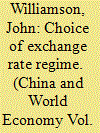| Srl | Item |
| 1 |
ID:
064879


|
|
|
|
|
| Publication |
May-Jun 2005.
|
|
|
|
|
|
|
|
|
|
|
|
|
|
|
|
| 2 |
ID:
138902


|
|
|
|
|
| Summary/Abstract |
The present paper studies China's national level currency exposure since 2005 when the country adopted a new exchange rate regime allowing the renminbi (RMB) to move towards greater flexibility. Using generalized autoregressive conditional heteroskedastic and constant conditional correlation-generalized autoregressive conditional heteroskedastic methods to estimate the augmented capital asset pricing models with orthogonalized stock returns, we find that China equity indexes are significantly exposed to exchange rate movements. In a static setting, there is strong sensitivity of stock returns to movements of China's tradeweighted exchange rate, and to the bilateral exchange rates except the RMB/dollar rate. However, in a dynamic framework, exposure to all the bilateral currency pairs under examination is significant. The results indicate that under the new exchange rate regime, China's gradualist approach to moving towards greater exchange rate flexibility has managed to keep exposure to a moderate level. However, we find evidence that in a dynamic setting, the exposure of the RMB to the dollar and other major currencies is significant. For China, the challenge of managing currency risk exposure is looming greater.
|
|
|
|
|
|
|
|
|
|
|
|
|
|
|
|
| 3 |
ID:
054142


|
|
|
| 4 |
ID:
119148


|
|
|
|
|
| Publication |
2013.
|
| Summary/Abstract |
International financial adjustment is the process whereby valuation shifts from asset price and currency changes result in relatively durable net wealth transfers across countries' international balance sheets. This paper applies a financial valuation approach to estimate the direction and the broad extent of recent international financial adjustments on China's international balance sheet. We estimate China's international balance sheet losses resulting from the valuation shifts over the period 2005-2010 and reveal that international currency shifts over the past decade have also generated a range of non-balance sheet financial and monetary adjustment pressures for China. This paper also evaluates how China's evolving international financial policy arrangements could better mitigate China's exposure to international financial adjustments. These arrangements include a more effective currency mechanism and the mechanisms to internationalize the RMB to buffer international financial valuation shocks.
|
|
|
|
|
|
|
|
|
|
|
|
|
|
|
|
| 5 |
ID:
182784


|
|
|
|
|
| Summary/Abstract |
The unpegging of China's currency in 2005 creates positive wealth effects that trigger Chinese foreign buyers' responses to pay 3.42% more in housing prices relative to other foreign buyers. We find evidence of a higher propensity to purchase housing units with more visible features among Chinese foreign buyers after the policy shock relative to other foreign buyers. Chinese foreign buyers pay 11.0% premiums for high-floor units, 7.25% premiums for large units and 4.61% for luxury (more expensive) units after experiencing positive incomrtde shocks. We find that conspicuous consumption motives are augmented in high-income neighborhoods and neighborhoods with strong enclaves and social networks comprising residents from China. We show that conspicuous consumption motives are more significant for Chinese foreign buyers who are owner occupiers than for those who are investors. The results survive a slew of robustness and falsification tests, and we cannot reject the finding of wealth-induced conspicuous consumption by Chinese foreign buyers in Singapore's private housing market.
|
|
|
|
|
|
|
|
|
|
|
|
|
|
|
|
| 6 |
ID:
077035


|
|
|
| 7 |
ID:
054141


|
|
|
| 8 |
ID:
074183


|
|
|
|
|
| Publication |
2006.
|
| Summary/Abstract |
China faces rising current account surpluses and foreign reserves. Maintaining the fixed exchange rate runs the risk of overheating of the economy. It is desirable to pursue greater flexibility of the exchange rate regime in the short run, and gradual liberalization of capital account transactions in the medium run. Proper sequencing of various steps is recommended to prevent financial crises. Japan's transition from the dollar peg to a more flexible exchange rate system in 1971–1973 is considered to be a mistake, whereas the gradual capital account opening from the mid-1970s to mid-1990s is considered a success. The present study also analyzes Korea's mistake in opening its capital markets too far ahead of exchange rate flexibility, and liberalizing short-term capital rather than long-term capital. The challenge before China is similar to Japan's of 1969–1970, in the sense that the transition from the dollar peg is inevitable and desirable for the country, but decisive actions with proper sequencing are important.
|
|
|
|
|
|
|
|
|
|
|
|
|
|
|
|